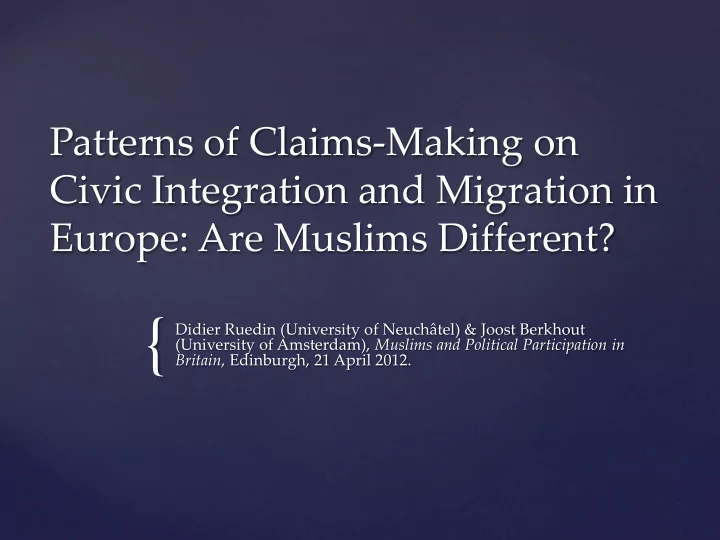

Patterns of Claims-Making on Civic Integration and Migration in Europe: Are Muslims Different? { Didier Ruedin (University of Neuchâtel) & Joost Berkhout (University of Amsterdam), Muslims and Political Participation in Britain , Edinburgh, 21 April 2012.
Outline Research question Expectations Data Muslims as Claimants Claims about Muslims Frames and Topics Conclusions
Two research questions What kind of migration-related group- categories are used in political debate on migration and integration? Ethnic, religious, racial or administrative categories? Under which circumstances do find a religion-based (i.e. Muslim) migrant identity?
Relevance of question Translation of social differences into political differences: theoretical puzzle: what comes first? Muslims often, increasingly (?) singled out Structural, policy-based country differences main focus of theory – is that the whole story?
Migrant-group categories Findings by Koopmans et al. (2005): Germany: National origin (67%) France: Administrative categories (41%) Britain: Racial categories (43%)
Potential explanations Country (time) level Claims level Policy tradition: Citizenship regime: civic vs. ethnic Mediating factors: Migrant categorisation : *Justification: Social-structural: (1) status, (2) racial, (3) instrumental or Demographics: size of religious and (4) country of identity (Muslim) migrant group origin or ethnic identities. *Topic: migration or integration Politics: Anti-Muslim party. Over time: Muslim extremist events (9-11)
Case Selection and Data Claims-analysis 1995-2009 Seven receiving countries SOM: www. som - project .eu (FP7)
Claims-Making Object actor Subject actor
Categorization of Migrants All AT BE IE NL ES CH UK Status Groups 83% 91% 82% 98% 78% 95% 79% 58% Racial Group 4% 1% 2% 1% 1% 2% 1% 25% Religious Groups 10% 7% 14% 0% 12% 0% 19% 16% Migrant Groups 3% 1% 2% 1% 9% 3% 1% 1%
Austria Belgium Netherlands 90% 50% 10% 1995 2000 2005 1995 2000 2005 1995 2000 2005 Spain Switzerland Britain Over Time 90% 50% 10% 1995 2000 2005 1995 2000 2005 1995 2000 2005
Muslims as Claimants Governments (31% of claims) Muslim organizations ( 2.7% of claims) 10% claims are about Muslims Human rights and solidarity movements Different response to terror attacks: UK: increase, ES: no difference Citizenship regime, population, parties
Claims about Muslims AT BE CH ES IE NL UK Muslims (Group) 6% 8% 12% 0% 0% 8% 11% Muslim Organizations 2% 3% 1% 2% 1% 6% 3% Muslims 8% 11% 13% 2% 1% 14% 14% Citizenship regime, population, parties
Frames in Claims about Muslims Immigrants Muslims Instrumental Frames 58% 33% Identity Frames 10% 34% Moral Principles 32% 33%
Topics in Claims about Muslims Immigrants Muslims Immigration 53% 2% Integration 47% 98%
Conclusions Migrant categories Significant differences between countries Not directly Koopmans’ typology Dynamic: changes over time Policy versus politics Many claims about Muslims, not by Muslims Other actors shape the category ‘Muslim’
Recommend
More recommend